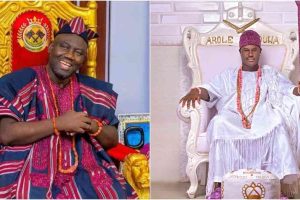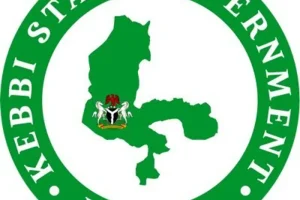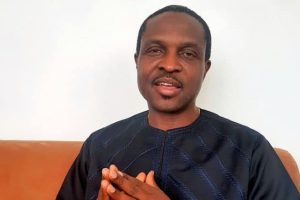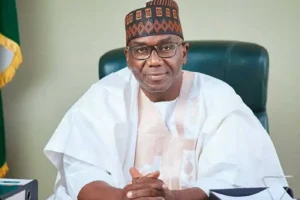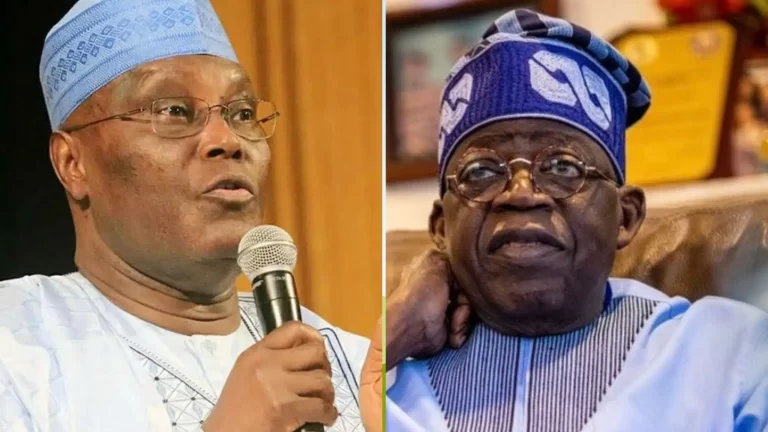
Former Vice President of Nigeria, Atiku Abubakar, has strongly criticized President Bola Tinubu, describing him as the epitome of political desperation.
In a statement released on Wednesday by his media aide, Paul Ibe, Atiku argued that Tinubu had abandoned the progressive ideals that once defined his political career.
Gists9ja reports that he asserted that the President had transformed the All Progressives Congress (APC) into a party that now revolves entirely around his personal ambitions, rather than functioning as a democratic institution.
Atiku further accused President Tinubu of turning state institutions into extensions of his personal political machinery by strategically appointing his loyalists to key positions. This, he argued, was an effort to maintain political dominance and suppress opposition.
Atiku’s Response to APC’s Criticism
Atiku’s remarks were made in direct response to a statement from the APC, which had earlier dismissed his allegations that Tinubu’s administration had paid a ₦50 million bribe to weaken opposition parties ahead of the 2027 elections.
Speaking at a national conference on strengthening democracy in Nigeria, held in Abuja on Monday, Atiku had raised concerns about the government’s actions. However, in a swift rebuttal on Tuesday, the APC dismissed his claims as baseless and challenged him to provide concrete evidence to support his accusations.
Despite the ruling party’s pushback, Atiku stood his ground, stating that he was merely speaking truth to power. He urged the Tinubu-led APC to refrain from undermining democracy and attempting to establish a one-party system. He also called on the ruling party to shift its focus from personal attacks to addressing pressing national issues.
Atiku’s statement read in part:
“On January 27, the Centre for Leadership, Strategy, and Development convened a national conference, bringing together civil society organizations to discuss the future of democracy in Nigeria. The event aimed to foster dialogue and find solutions to strengthen the country’s democratic structures.”
“Among the distinguished speakers was Atiku Abubakar, a former Vice President known for his extensive political experience. During his address, he voiced deep concerns over the APC’s increasing monopoly on power, warning that the party’s actions were systematically weakening Nigeria’s multi-party democracy.”
“Rather than addressing these concerns through constructive dialogue, the APC, under President Bola Tinubu, chose to resort to personal attacks. This pattern of defensiveness, rather than engagement, is indicative of a government struggling with credibility.”
Atiku went further to state that if any politician in Nigeria embodies desperation, it is President Tinubu himself. He accused Tinubu of blurring the lines between state power and personal ambition, consolidating control over national institutions for political gain.
Allegations of Electoral Manipulation
Atiku also alleged that President Tinubu was actively working to weaken opposition parties and manipulate electoral institutions. He claimed that the President’s appointments in the Independent National Electoral Commission (INEC) were designed to ensure APC’s continued dominance in future elections.
He highlighted concerns that Tinubu had placed political loyalists in strategic electoral positions, a move Atiku described as a direct threat to Nigeria’s democratic integrity.
Furthermore, Atiku accused the Tinubu administration of engaging in conflict of interest, particularly in awarding high-value government contracts to companies linked to the President’s family. He warned that such actions signaled the rise of an authoritarian regime, comparing it to historical repressive governments that suppressed dissent.
“Opposition parties are now facing existential threats, infiltrated by individuals who work to weaken them from within. This systematic dismantling of democratic opposition creates an environment where no political party—whether ruling or opposition—can function independently of the President’s influence.”
“Moreover, the Tinubu administration continues to pack the electoral commission with loyalists, eroding its independence and credibility. This is an alarming trend that threatens the core principles of free and fair elections in Nigeria.”
Atiku concluded his statement with a stern warning to the APC. He urged the ruling party to take a moment of self-reflection, cautioning that true desperation is not found in opposition leaders raising concerns, but in a government that refuses to engage in open dialogue and democratic governance.
He called on President Tinubu and the APC to prioritize national interests over personal ambition, warning that failure to do so could lead Nigeria further down a dangerous path of democratic regression.
“For the sake of Nigeria’s future, it is crucial that democratic values are upheld, and institutions are allowed to function without political interference. The ruling party must take responsibility and acknowledge the growing concerns about its actions.”
Atiku Abubakar’s criticism of President Tinubu highlights growing concerns about the state of democracy in Nigeria. His accusations of electoral manipulation, suppression of opposition, and monopolization of state power are significant allegations that warrant deeper scrutiny.
As Nigeria moves towards the 2027 elections, the debate over democratic governance, electoral integrity, and political accountability is likely to intensify. Whether Tinubu and the APC will address these concerns remains to be seen.


